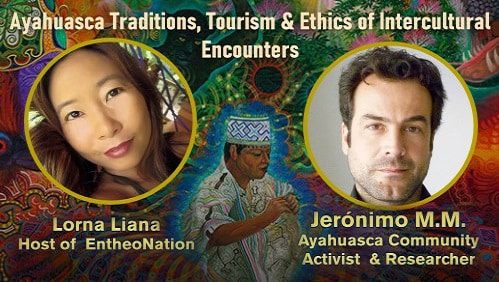Ayahuasca Traditions, Tourism & Ethics of Intercultural Encounters with Jerónimo M. M.

Ayahuasca researcher Jerónimo M.M. talks to us about how Western tourism has changed ayahuasca traditions, and what Western interest could mean for the future of ayahuasca…
“Every time something new and valuable is found in the jungle, there’s a new wave of colonists who come to take it…”
Jerónimo M.M. is an ayahuasca community activist and independent researcher. In the past decade, he has written and produced two documentaries about ayahuasca. He has travelled extensively through South America, researching a broad range of ayahuasca practices, and has lectured internationally on ayahuasca tourism and the appropriation of indigenous knowledge. He is the Social Innovation Coordinator at the ICEERS Foundation.
In this interview, you will discover:
- Some of the most common misunderstandings between Western seekers and Indigenous Plant Healers
- The connections between spiritual pilgrimages and ayahuasca tourism
- The ethical responsibilities of the neo-shamanic calling
In this discussion, Jerónimo takes us through the early days of ayahuasca research in Brazil in the 2000s, and discusses how the increasing Western interest in ayahuasca has influenced and changed traditional ayahuasca ceremonies.
MUST READ: What is a ‘traditional’ ayahuasca ceremony?
While Western influence on ayahuasca culture has had positives and negatives for both Westerners and indigenous peoples, it has created extra complexity in the way that we understand ayahuasca. Indigenous shamans feel pressure to adapt their ceremonies to cater to Western ways of thinking, and Western retreats will often focus more on money than accuracy.
Although money (or some form of exchange) has always been a part of Amazonian shamanism, Westerners have started to spread some harmful myths about indigenous culture, while themselves profiting off indigenous knowledge.
MUST READ: Myths about shamanism and money.
Jerónimo emphasizes that when it comes to the issue of cultural appropriation, the most important question to ask is who benefits? If a privileged white person benefits more than the indigenous from practicing shamanism then it is appropriation. There must be a reciprocal relationship for the fair use of cultural knowledge. It’s not necessarily about respect and mindfulness, but where the power is, and how the power and benefit flows in the relationship.
Finally, we discuss the tourism paradox – how tourists are always seeking new and undiscovered locations which are immediately ‘tarnished’ – and how society will be unlikely to ever fully embrace the indigenous concepts of plant medicine healing.
About Jerónimo M. M.
Jerónimo Mazarrasa is a documentary filmmaker, independent researcher, and interaction designer with extensive knowledge of the world of ayahuasca. In the past decade he has produced, written and directed two documentaries about ayahuasca. The first about the Brazilian ayahuasca churches, the second about the use of ayahuasca in the treatment of drug addiction.
He has traveled extensively through South America, researching a broad range of ayahuasca practices, and has lectured internationally on ayahuasca tourism and the appropriation of indigenous knowledge. He keeps a blog, curates a page of ayahuasca related news, and is currently preparing a book about his experiences. He currently serves the ICEERS Foundation as Social Innovation special projects coordinator.
Where to Find Jerónimo
Learn More About Shamanism and Plant Medicine
Join our Modern Shaman Mystery School and gain access to a huge archive of interviews like this one.
Get the Free Gift
>> Free Course: Spiritual Tourism and Intercultural Encounters >> Learn about different spiritual pilgrimages around the world and across time. Gain a critical understanding of how shamanic tourism in the Amazon jungle is part of an ancient calling of the spirit.
